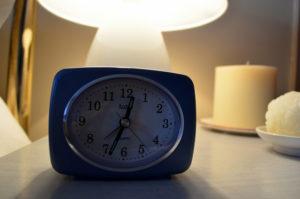Updated from the October 15, 2015 original post
We’ve talked before about the relationship between sleep and good health – and how it’s not just the quantity of sleep that counts but the quality of that sleep.
 That quality, it turns out, may be affected by the timing of your sleep. So suggests research out of Washington State University.
That quality, it turns out, may be affected by the timing of your sleep. So suggests research out of Washington State University.
The study, published in Brain, Behavior, and Immunity, looked at what happens to sleep when you disrupt the circadian system – the body’s internal clock, which controls the rhythm of various biological processes, including sleep. These built-in cues work without signals from the external environment, although they’re set – and reset – by the natural cycle of light and dark.
In a wholly natural environment, we humans will wake with daylight and sleep with darkness, but not necessarily through the whole night. Before the advent of electric light, the tendency was to sleep until about midnight, then wake for a couple hours before resuming a “second sleep” until sun-up.
That natural pattern has been hugely disrupted by the brightly lit, 24/7, always-connected society we now find ourselves living in. Our circadian rhythms are sublimely messed up. And according to the latest research, this appears to have a major impact on the quality of sleep, and thus our overall health and well-being.
To understand this effect more specifically, according to the Washington State University media release,
The researchers used mice whose body clocks run at about 24 hours – much like our own – and housed them in a shorter 20-hour day. This forced their biological clocks out of sync with the light-dark cycle. After four weeks, the researchers injected the mice with lipopolysaccharide, a molecule found in bacteria that can make an animal sick without being contagious.
The researchers saw that the disrupted animals had blunted immune responses in some cases or an overactive response in others, suggesting the altered circadian cycle made them potentially less able to fight illness and more likely to get sick.
“This represents a very clear dysregulation of the system,” said Karatsoreos. “The system is not responding in the optimal manner.” Over time, he said, this could have serious consequences for an organism’s health.
“Just like you have a car that you’re running into the ground—things don’t work right but you keep driving it until it stops. That’s what could happen if you think of disruption going on for years for somebody who’s working shift work,” he said.
What’s especially interesting is that the mice still slept as much as they did when their clocks were set to the 24 hour cycle. It just wasn’t good sleep. They woke more often, and experienced less of the brain activity associated with restorative sleep.
Unfortunately, the way of our world makes it hard if not impossible to sleep according to anything like a wholly natural cycle. The demands of work and family and other obligations tend to go very much against this.
But there are things you can do to help ensure that the sleep you get a good night’s sleep regardless. A few that you may find particularly helpful:
- Keep a regular bedtime, both weekdays and weekends. According to the Indian medicine tradition of Ayurveda, we should retire no later than 10pm each night.
- Similarly, get up at the same time every morning.
- Keep technology away from your bed or, even better, out of the bedroom all together. The blue light from tablets, smartphones and other devices tends to be very disruptive of sleep.
- Avoid caffeine and alcohol in the evening, as well as eating after 7pm.
- Consider using supplements that support good sleep. These include magnesium and calcium, as well as the amino acid glycine, for promoting the deep, non-REM sleep you need. If you need help with relaxing, melatonin and valerian are two good non-pharmaceutical options.
Image by AIsforAmy91, via Flickr